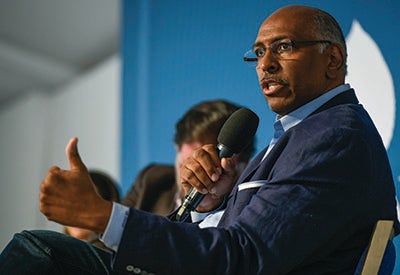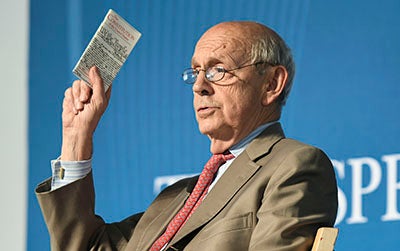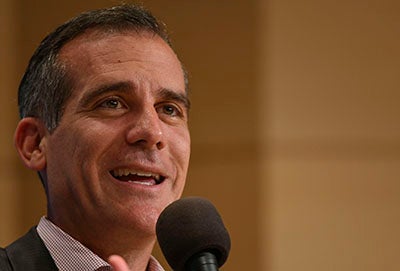Every summer, the McCloskey Speaker Series invites newsmakers and international leaders to the stage in Aspen for frank talk about culture and politics today. This year, speakers explored hot-button issues like climate change and immigration as well as societal themes like civility and the strength of democratic institutions. Below are just a few highlights from a season of rich discussions.
The Future Right
 Mickey Edwards, an Institute vice president and former US congressman, brought top thinkers on the political right to the McCloskey Speaker Series to talk about the Republican Party in the Trump era. Featuring The Wall Street Journal’s Allysia Finley, National Review’s Jonah Goldberg, and Michael Steele, the former lieutenant governor of Maryland, former Republican National Committee chairman, and an Aspen Institute–Rodel fellow in public leadership, the panel examined the philosophical underpinnings of conservatism. Specifically, the group discussed what President Trump means to the GOP’s future. “After this Wild, Wild West moment we’re having in politics, the country will change dramatically,” Steele said. “It’ll look a lot more like me than it does you. And they will be holding key positions of power—not just in economics, not just in policy, but in votes. By 2043, the country will be majority minority. The Republican Party right now has laid down tracks that will make it very difficult for that new majority to call itself or identify in any way with conservatism or Republicanism. That’s what’s at stake.”
Mickey Edwards, an Institute vice president and former US congressman, brought top thinkers on the political right to the McCloskey Speaker Series to talk about the Republican Party in the Trump era. Featuring The Wall Street Journal’s Allysia Finley, National Review’s Jonah Goldberg, and Michael Steele, the former lieutenant governor of Maryland, former Republican National Committee chairman, and an Aspen Institute–Rodel fellow in public leadership, the panel examined the philosophical underpinnings of conservatism. Specifically, the group discussed what President Trump means to the GOP’s future. “After this Wild, Wild West moment we’re having in politics, the country will change dramatically,” Steele said. “It’ll look a lot more like me than it does you. And they will be holding key positions of power—not just in economics, not just in policy, but in votes. By 2043, the country will be majority minority. The Republican Party right now has laid down tracks that will make it very difficult for that new majority to call itself or identify in any way with conservatism or Republicanism. That’s what’s at stake.”
aspeninstitute.org/mccloskey-steele
“We’re not Always Going to Agree”
 The Institute’s McCloskey Speaker Series also hosted a conversation between Supreme Court Justice Stephen Breyer and Joshua Johnson, the host of the NPR radio show and podcast 1A. Breyer emphasized the complexity of the Court’s deliberative process. There are multiple audiences, Breyer explained, for any decision: the parties, lawyers, other judges, and society as a whole. “You are trying to get something to work in this messy, complicated, multi-institutional body called the law—and we’re not always going to agree,” Breyer said. He remains optimistic about the endeavor, however. He said there has been no personal hostility among the justices, even when on opposite sides of an issue. Breyer also stressed the importance of civic education as the most significant way to create an informed electorate. Civics, he said, can help Americans productively engage with one another, even when they disagree—a lesson the Court has learned and one the country could use.
The Institute’s McCloskey Speaker Series also hosted a conversation between Supreme Court Justice Stephen Breyer and Joshua Johnson, the host of the NPR radio show and podcast 1A. Breyer emphasized the complexity of the Court’s deliberative process. There are multiple audiences, Breyer explained, for any decision: the parties, lawyers, other judges, and society as a whole. “You are trying to get something to work in this messy, complicated, multi-institutional body called the law—and we’re not always going to agree,” Breyer said. He remains optimistic about the endeavor, however. He said there has been no personal hostility among the justices, even when on opposite sides of an issue. Breyer also stressed the importance of civic education as the most significant way to create an informed electorate. Civics, he said, can help Americans productively engage with one another, even when they disagree—a lesson the Court has learned and one the country could use.
aspeninstitute.org/mccloskey-breyer
Cities of Light
 US cities are leading the way in public policy. And Los Angeles is at the forefront of that movement—so said LA Mayor Eric Garcetti at the McCloskey Speaker Series. Los Angeles, Garcetti said, is taking on tough national and international issues. For example, the day President Donald Trump announced that the United States would pull out of the Paris Climate Agreement, Garcetti said, “I started calling cities and saying, ‘He says he’s out; let’s say we’re in.’ ” The result? The Mayors National Climate Action Agenda, a promise among more than 400 US cities and 70 million Americans to uphold the Paris accord. And since building codes, transportation, and electricity generation are the work of local government, cities have become “the most necessary and best platform in the world” for the environment. Garcetti, whose family background is Mexican and Jewish, became emotional on the topic of immigration. He said current federal laws are “dehumanizing” and likened a zero-tolerance border policy to “taking a hammer to an already broken system, smashing it further, and now looking at the pieces and trying to figure out how to repair it.” His own local immigration policies have included funding for legal services for undocumented migrants, declining federal requests to detain arrestees, and helping to reunite migrant families. Garcetti noted that immigrants started fully 61 percent of LA’s newest businesses. “I want economic prosperity, I want family unity, and I want safe streets,” Garcetti said.
US cities are leading the way in public policy. And Los Angeles is at the forefront of that movement—so said LA Mayor Eric Garcetti at the McCloskey Speaker Series. Los Angeles, Garcetti said, is taking on tough national and international issues. For example, the day President Donald Trump announced that the United States would pull out of the Paris Climate Agreement, Garcetti said, “I started calling cities and saying, ‘He says he’s out; let’s say we’re in.’ ” The result? The Mayors National Climate Action Agenda, a promise among more than 400 US cities and 70 million Americans to uphold the Paris accord. And since building codes, transportation, and electricity generation are the work of local government, cities have become “the most necessary and best platform in the world” for the environment. Garcetti, whose family background is Mexican and Jewish, became emotional on the topic of immigration. He said current federal laws are “dehumanizing” and likened a zero-tolerance border policy to “taking a hammer to an already broken system, smashing it further, and now looking at the pieces and trying to figure out how to repair it.” His own local immigration policies have included funding for legal services for undocumented migrants, declining federal requests to detain arrestees, and helping to reunite migrant families. Garcetti noted that immigrants started fully 61 percent of LA’s newest businesses. “I want economic prosperity, I want family unity, and I want safe streets,” Garcetti said.